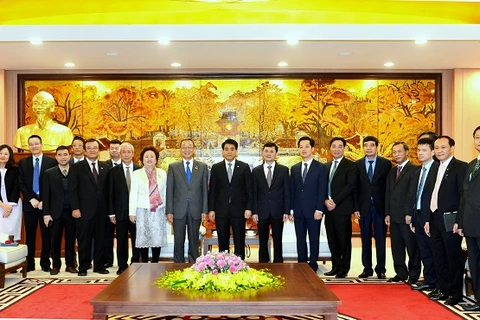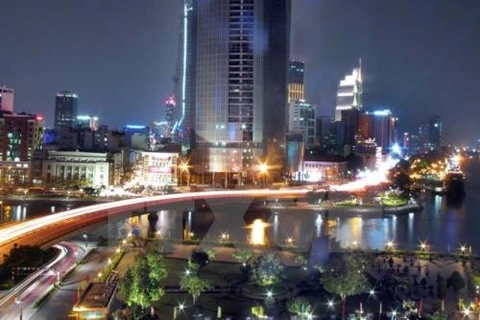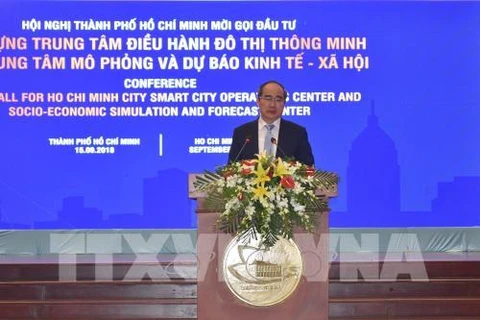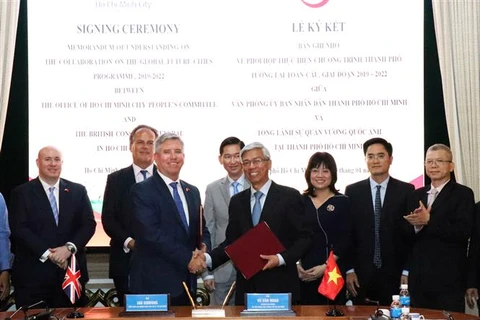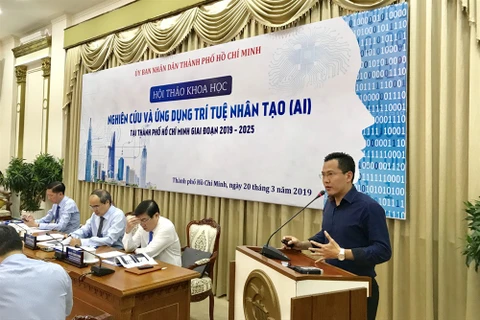Hanoi (VNA) – The Red River Delta urban cluster is striving to build green and sustainable cities.
To do so, the cluster will focus on investment in developing public spaces, collecting and treating daily waste.
At a conference recently held in northern Ninh Binh province, Vice Chairman of the Vietnam Urban Areas Association Nguyen Van Suu evaluated that the infrastructure in the Red River Delta urban cluster has been significantly improved.
He asked member cities to base on the local urban development goals to build and implement specific plans on building clean, green and beautiful urban areas.
Delegates at the event spent a large amount of time sharing experience and solutions in environmental hygiene and development of lighting system towards the building of smart cities.
The panels also pointed out shortcomings in the field such as expenses for urban management and environment hygiene as well as technical infrastructure improvement and land clearance.
The Red River Delta urban cluster consists of 15 cities such as the capital city of Hanoi, Hai Phong, Nam Dinh, Hai Duong, Chi Linh (Hai Duong), Vinh Yen, Phuc Yen (Vinh Phuc), Bac Ninh, Phu Ly (Ha Nam), Thai Binh, Ninh Binh, Tam Diep (Ninh Binh), Son Tay (Hanoi), and Tu Son (Bac Ninh).
Over the past time, cities in the cluster have seized all financial resources to upgrade the infrastructure, especially roads, lighting system, water drainage, and waste treatment to serve local socio-economic development.
Notably, Vinh Yen city in the northern province of Vinh Phuc have planted 50,000 trees.
In addition to speeding up urban development towards green growth, cities in the cluster have increased public awareness raising campaigns about building green, clean and beautiful urban areas towards the building of smart cities.
In efforts to embrace the Fourth Industrial Revolution, cities and provinces in Vietnam are pushing smart city programmes, combining technology with internet-connected devices to enhance municipal management and economy.
Smart cities, with new technologies and integration based on sensor collection and analysis of data, are expected to drive economic, environmental and social benefits in many cities and provinces in Vietnam – optimising traffic flows in real time, reducing energy consumption and automating waste management.
However, despite the countless benefits of smart city projects, major cities including Hanoi and HCM City, which are pioneering in this field, are facing difficulties and challenges when it comes to deployment due to city-specific requirements and needs of new policies and regulations from the Government and relevant sectors.
According to Vice Chairman of the HCM City People’s Committee Tran Vinh Tien smart cities are different from East Asia to South Asia, and advised Vietnamese cities conduct a smart city project suited to their characteristics because the application of the Fourth Industrial Revolution will solve specific problems of each city such as traffic congestion, flooding, and environment pollution.
He suggested building an information centre allowing interaction among local authorities, businesses and people. In which, the State and businesses would be able to exploit each other’s data while people could share contributions and ideas. All of these interaction must be digital.
Therefore, the Government should build a legal corridor for data management soon.
“The data area is even more important than land. If we want to manage the data area effectively and synchronously we need to have a legal corridor.”
Tien also proposed the Government set up a smart city architectural blueprint for all cities and provinces nationwide, ensuring synchronisation – which is the most basic principle of technology – and efficiency.
“In addition, as the Government has approved the digitalisation project, we want to volunteer. If we do not digitalise, technology of the city will be not effective,” Tien added./.

